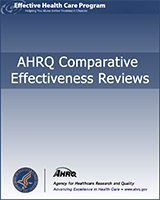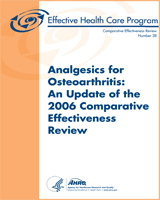NCBI Bookshelf. A service of the National Library of Medicine, National Institutes of Health.
Chou R, Helfand M, Peterson K, et al. Comparative Effectiveness and Safety of Analgesics for Osteoarthritis [Internet]. Rockville (MD): Agency for Healthcare Research and Quality (US); 2006 Sep. (Comparative Effectiveness Reviews, No. 4.)
This publication is provided for historical reference only and the information may be out of date.

Comparative Effectiveness and Safety of Analgesics for Osteoarthritis [Internet].
Show details- Nearly all of the clinical trials reviewed in this report were “efficacy” trials conducted in ideal settings and selected populations. “Pragmatic” trials that allow flexible dosing or medication switches and other clinical trials of effectiveness would be very valuable for learning the outcomes of different analgesic interventions in real-world settings.
- The cardiovascular safety of non-selective NSAIDs has not been adequately assessed in large, long-term clinical trials. Naproxen in particular may have a different cardiovascular safety profile than other NSAIDs and should be investigated in long-term, appropriately powered trials. The cardiovascular risks associated with the partially selective NSAIDs meloxicam, nabumetone, and diclofenac also have not been well studied.
- Large observational studies assessing the safety of NSAIDs have been helpful for assessing comparative benefits and harms, but have generally had a narrow focus on single adverse events. Observational studies that take a broader view of all serious adverse events would be substantially more helpful for assessing the overall trade-offs between benefits and harms.
- The cardiovascular risks and GI benefits associated with different COX-2 selective NSAIDs may vary. Large, long-term trials with active and placebo-controlled arms would be needed to assess the safety and benefits of any new COX-2 selective analgesic.
- Meta-analyses of the risks associated with selective COX-2 inhibitors need to better assess for the effects of dose and duration, as most of the cardiovascular risks have only occurred with prolonged use and at higher doses.
- Large, long-term trials of the GI and cardiovascular safety associated with full-dose aspirin, salsalate, or acetaminophen compared with non-aspirin NSAIDs or placebo are lacking.
- Given the large number of patients who meet criteria for aspirin prophylaxis for cardiovascular events, more trials evaluating the effects of low-dose aspirin on GI and CV risks are needed.
- Trials and observational studies evaluating comparative safety or efficacy should be sufficiently inclusive to evaluate whether effects differ by race or gender.
- Genetic testing could theoretically help predict patients who are at higher risk of cardiovascular complications from selective COX-2 inhibitors because of differences in the COX-2 gene promoter or other genes. This is a promising area of future research.
- The effects of alternative dosing strategies such as intermittent dosing or drug holidays have not been assessed. Studies evaluating the benefits and risks associated with such strategies compared with conventional dosing could help clarify the effects of these alternative dosing strategies. In addition, although there is speculation that once daily versus twice daily dosing of certain COX-2 inhibitors could affect CV risk, this hypothesis has not yet been tested in a clinical trial.
- Most trials showing therapeutic benefits from glucosamine were conducted using pharmaceutical grade glucosamine not available in the U.S. and may not be applicable to currently available over-the-counter preparations. Large trials comparing currently available over-the-counter preparations to oral NSAIDs are needed, as these are likely to remain available even if the FDA approves a pharmaceutical grade glucosamine. Additional long-term trials are also required to further evaluate effects of glucosamine on progression of joint space narrowing.
- No topical NSAIDs are FDA-approved in the U.S., yet compounding of NSAIDs is widely available. Although recent trials of topical NSAIDs are promising, most have been conducted using a proprietary formulation of diclofenac with DMSO. A UK trial of topical versus oral ibuprofen is currently in progress and will help clarify the benefits and safety of topical versus oral NSAIDs. However, cohort studies using large observational databases may be required to adequately assess cardiovascular risk.
- Future Research - Comparative Effectiveness and Safety of Analgesics for Osteoar...Future Research - Comparative Effectiveness and Safety of Analgesics for Osteoarthritis
- TYR_PHOSPHATASE_2 domain-containing protein [Caenorhabditis elegans]TYR_PHOSPHATASE_2 domain-containing protein [Caenorhabditis elegans]gi|392896071|ref|NP_001254989.1|Protein
- GH18 domain-containing protein [Caenorhabditis elegans]GH18 domain-containing protein [Caenorhabditis elegans]gi|392891223|ref|NP_001254212.1|Protein
- MAG: Candidatus Electrothrix sp. ATG2, whole genome shotgun sequencing projectMAG: Candidatus Electrothrix sp. ATG2, whole genome shotgun sequencing projectgi|2214681548|gb|QYLD00000000.1|QYL 0000Nucleotide
- Drosophila melanogaster wingless (wg), mRNADrosophila melanogaster wingless (wg), mRNAgi|665404751|ref|NM_078778.5|Nucleotide
Your browsing activity is empty.
Activity recording is turned off.
See more...
